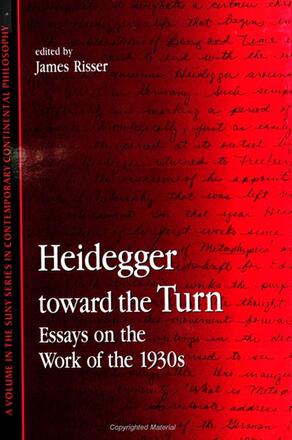
Heidegger toward the Turn
Essays on the Work of the 1930s
Alternative formats available from:
Leading figures in Heidegger scholarship critically reflect on the dominant topics of Heidegger's thought during the 1930s.
Description
Heidegger toward the Turn is the first sustained critical reflection on topics that came to dominate Heidegger's thinking during the 1930s, when his thinking is said to have undergone a "turn." These topics include the nature of the truth of being, the destruction of the history of metaphysics, the relation between art and philosophy, and the thinking of human destiny within the political climate of National Socialism.
Contributors include Robert Bernasconi, John D. Caputo, Françoise Dastur, Veronique Foti, Hans-Georg Gadamer, Rodolphe Gasché, Michel Haar, David Farrell Krell, Will McNeill, John Sallis, Dennis J. Schmidt, Reiner Schürmann, Charles Scott, Jacques Taminiaux, and Wilhelm Wurzer.
James Risser is Professor of Philosophy at Seattle University and is the author of Hermeneutics and the Voice of the Other: Re-reading Gadamer's Philosophical Hermeneutics, also published by SUNY Press.
Reviews
"This is a fine collection of essays written by leading figures in Heidegger scholarship that will be of interest to both the specialist and student alike. The issues at stake during the period examined are not only important for coming to understand Heidegger's thought, but also critical ones for evaluating Heidegger's impact as a thinker. Moreover, granted Heidegger's own political failures during this time, their adjudication is a difficult undertaking. These essays significantly contribute to that task." — Stephen H. Watson, author of Extensions: Essays on Interpretation, Rationality, and the Closure of Modernism
"Written by some of the most important continental philosophers of our time, this book offers the most comprehensive and philosophically rich interpretation of Heidegger in the 1930s that is available." — Walter A. Brogan, Villanova University